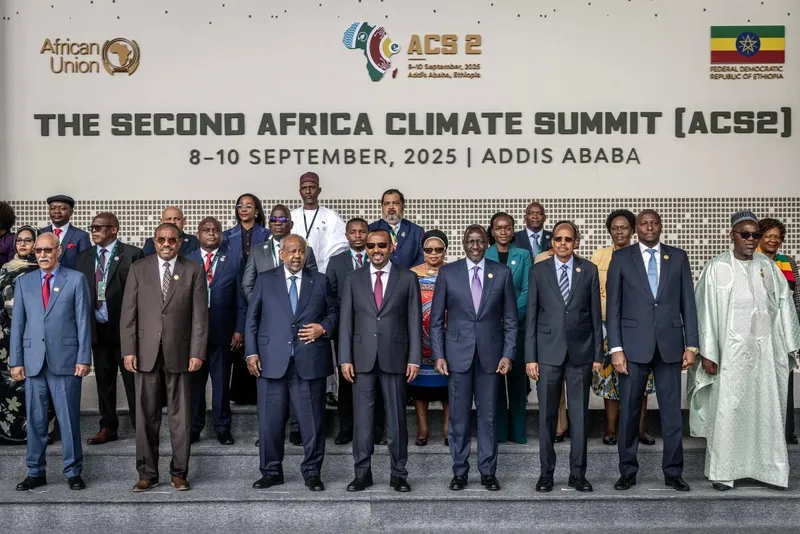Reviving the Spirit of Bandung in an Era of Geopolitical Uncertainty
On this South-South Cooperation Day, we must recommit to the Bandung spirit. Just as leaders in 1955 refused to be silenced by colonial powers or divided by Cold ...
Institutional Reform Vital for South Africa's Evolving Political Landscape
As South Africa moves toward the 2026 local government elections, the stakes could not be higher. The proliferation of political parties reflects both the dissatisfaction ...
Cyril Ramaphosa's Presidency: A Paradox of Reform and Failure
The time has come to break with illusion. Cyril Ramaphosa, despite his carefully packaged reforms, is unfit to lead South Africa. His removal is not merely desirable ...
Understanding the Geopolitical Shifts: A Reflection on Today's Challenges
Africa appears locked into existing positions while the ground is shifting. The belief that rescue exists from Europe, America, or China is misplaced, and greater ...
Sudan's Political Crisis Deepens as RSF Forms Parallel State
The RSF’s attempt to present itself as a governing authority raises questions of legitimacy both domestically and internationally. With the African Union having ...
SA's Absence from SCO Summit a 'Political Miscalculation'
The SCO Summit demonstrated that global realignment is accelerating, whether Africa chooses to participate or not. Africa cannot afford to remain on the sidelines, and ...
SACP's Navigation of Complex Alliance Politics a Tough Task
The South African Communist Party faces critical questions as it prepares to contest the 2026 Local Government Elections independently from the ANC. During times ...
Reversing Institutional Decay A Tall Order for an ANC in Freefall
For the first time since 1994, the ANC enters an NGC not as the dominant force but as a diminished actor in a coalition government, compelled to negotiate its revolutionary ...
Botswana's Health Crisis Exposes Country's Fragile Political, Economic Systems
Botswana's lack of economic resilience is a warning for the region as a whole. Overreliance on a single resource is a factor in many economies in Africa. In Angola, ...
Honouring the History of Resistance, Working Together for a Brighter Future
As a permanent member of the United Nations Security Council, China has consistently pursued an independent foreign policy of peace, adhered to true multilateralism, ...
A Pivotal Moment for the ANC's Political Survival
The task before the ANC is significant. It calls for honesty, discipline, maturity, and a consistent commitment to the collective good. The National General Council ...
Malawi's 2025 Elections: A Test of Democratic Resilience
Malawi has shown in the past that its democracy and democratic institutions are robust, and electoral challenges can be solved through court processes rather than ...
The G20 and UN: Can Multilateralism Survive in an Era of Global Uncertainty?
Multilateral institutions matter because they convert friction into negotiated rules. The process is noisy, but the product is more stable than anything a single ...
'ANC's Renewal Will Remain a Fantasy Until it Purges Parasites'
The perception grows that the ANC is no longer a shield protecting the people from exploitation, but a gate through which exploitation freely passes. Once this perception ...
'DA's Call for the Devolution of Policing Powers is a Self-Serving Political Strategy'
The Western Cape has hinted at possible secession. This call for the devolution of policing powers to the province could be interpreted as part of the party’s bigger ...
TICAD 9: The Right Tonic for Africa as the Demise of AGOA Looms?
TICAD 9 is the right tonic for Africa at this point. It provides an attractive prospect in rocky times. It will help shield Africa as it ventures through the aftershock ...
Zambia, Israel Ties Erasing Africa’s Liberationist History
Israel’s embassy in Lusaka is therefore not simply about bilateral ties with Zambia. It is about erasing Africa’s liberationist history and replacing it with transactional ...
Gaza Under Siege: The Implications of Genocide for Africa
Gaza’s destruction is not just their story, but a mirror reflecting the fragility of our own freedom. To defend Palestine is to defend Africa, to protect the Global ...
Navigating Independence: Climate Challenges and Nationalism in India and Pakistan
The Climate crisis, flash floods, droughts, and monsoons, are a stark reminder that climate change knows no boundaries, race, religion, or language. A new narrative ...
